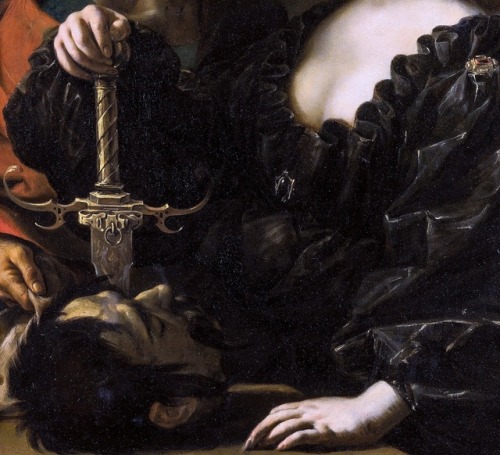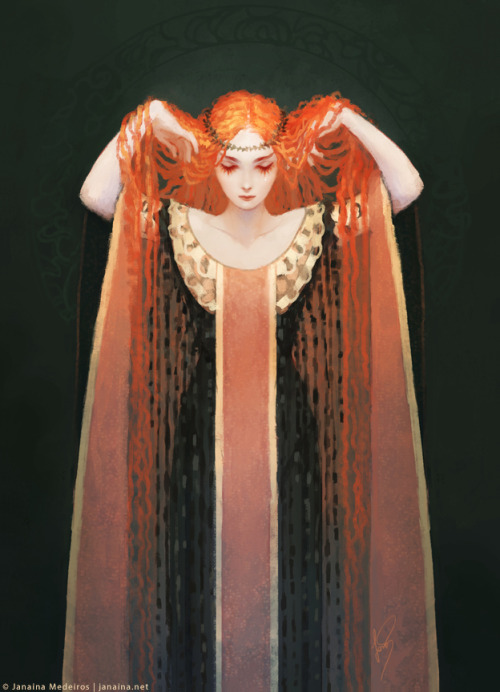AND IF We’re Talking About Ovid’s Take On The Persephone Myth Anyway, And The Other Story Ovid Inserted,
AND IF we’re talking about Ovid’s take on the Persephone myth anyway, and the other story Ovid inserted, the comparison between the boy being turned into a lizard for laughing at Demeter and the Demophon myth are so different in every single aspect that I cannot fathom what the use of the second one is to the Persephone myth, only to Ovid’s overall themes. While Demophon is a temporary stand-in for Persephone and perhaps even a tool Demeter uses to one-up her brothers, and is a cultic display of her matronly side as a goddess, the lizard tale just…provides comedy? Characterizes her as petty or fickle? It really is the most derailing story line in this part of the text, as Demeter is searching before it and after it. It only provides the mandatory metamorphosis, but so does Cyane? And the fun part is that the episode reflects the Homeric hymn in that Demeter is received as a guest and receives a specific type of food tied to her role as goddess of the grain, but here it has absolutely no payoff, nor any ambiguity to make us guess at more. It just…is.
More Posts from Ro0hafz4 and Others
“The so-called ‘mystery cults’ were a handful of marginal Eastern Mediterranean cults which achieved popularity throughout the Roman empire and were distinguished as a unique religious phenomenon by the Belgian archaeologist and philologist Franz Cumont in his 1906 book Oriental Religions in Roman Paganism. This modern label of ‘mystery cults’ has now long been used as a blanket designation to cover the cults held in honour of Mithra, Attis and Cybele, Isis and Osiris, Demeter and Persephone, Orpheus and Bacchus/ Dionysus, and the Samothracian Kabeiroi, among countless other minor and local groups who will never be remembered. Each of these cults (with perhaps the exception of Mithraism) revolved around the dramatic and ecstatic veneration of “dying-and-rising-gods,” a title formulated by the founding father of comparative religion, James G. Frazer, and subsequently developed by British and Scandinavian members of the Myth-and-Ritual School. These so-called “Cambridge Ritualists,” held to the notion that myths do not stand on their own, but are born out of ritual. This theory, of course, is heavily disputed; but the alternative view is equally enlightening: that myth and ritual evolve along parallel lines, without one developing strictly out from the other. The ‘Divine Bridegroom’ is similarly a name I use for these dying mystery gods. For the most part, the mystery religions were sanctuary based, taking place in a telestrion (initiation chambers), caves, or mountain groves, and their members were organized by a structure of hierarchical degrees of initiation. The “mysteries” themselves generally entailed dramatic experiences conveyed via esoteric initiation ceremonies that were reflections of annual agricultural and astrological cycles. Already the mainstream view of old-school ethnologists believed in the notion that the mysteries were survivals of ancient “rites of passage,” especially by Mircea Eliade and Angelo Brelich. Many believed that the origin of the mysteries should be sought in some stage of primitive agricultural development, and it is in illo tempore - into that mythic dream time - to which I wish to return throughout this book.”
— Dan Attrell - Shamanism and the Mysteries: A Brief History of the Cult of Ecstasy
the story of psyche







Denis Maurice, The Story of Psyche, 1908, The Hermitage, St. Petersburg: 1) Eros is Struck by Psyche’s Beauty; 2) Zephyr Transporting Psyche to the Isle of Delight; 3) Psyche Discovers that Her Mysterious Lover is Eros; 4) The Vengeance of Venus; 5) Jupiter Bestows Immortality on Psyche; 6) Psyche’s Kin Bid Her Farewell on a Mountain Top; 7) Cupid Carrying Psyche Up to Heaven.
you might've gotten this question before but I wondered, what are your favorite fairytales/myths? also just wanted to say i love your blog so much, scrolling through it feels like wandering in a magical garden 💚
apologies for answering this 3 days late! thank you so much for asking this, and for loving my blog… how lovely of you! i appreciate it, truly ♡
some fairytales i love:
bluebeard’s bride
death and the nightingale, by hans christian andersen. it’s about an emperor, a nightingale, a clockwork bird, and the grim reaper.
the goose girl
east of the sun, west of the moon -i’m linking a version with kay nielsen’s famous illustrations, because they add a lot to it!
i couldn’t find a text of this, and i know it’s obscure, but there’s this kashmiri folk tale called ‘the chinese princess’ that is about a lamia. i read it in ‘angela carter’s book of fairytales’ and it has stuck with me… i recommend hunting the book down digitally if you can!
my friend doe @rosedaughter once talked of a palestinian version of little red riding hood that i found so delightfully chilling and incredible… here’s the post where she recounts it.
this only loosely counts, but in the silmarillion by jrr tolkien, the creation myths - the music of the ainur, and how that fictional world was created - have stuck with me. i always found it wonderful to read. it’s called the ainulindale, it’s about the length of a chapter, and here is the text of it.
the frame story of 1001 nights - of sheherazade spinning tales every night to a prince and his court.
the crane wife / tsuru no ongaeshi
the twelve dancing princesses …i really love this one, it always fascinated me.
loosely related to the 12 dancing princesses, there is an anime called ‘princess tutu’ that’s about fairytales and story meta and character trope subversion and it’s incredible and i can’t recommend it enough. and although linking a fic is probably odd, there’s a fanfic for princess tutu that rewrites the story of the 12 dancing princesses in such a stunning way. i believe you can enjoy it even if you don’t know the show. it’s one of my favourite pieces of writing ever, read it here.
the ballad of tam lin! it’s a scottish fairytale that resembles a beauty and the beast-type tale, and i love it very much. here’s the wiki for it, you can read the full text from the link there.
again, this only loosely counts, but the poem ‘goblin market’ by christina rossetti is so beautiful. i love it, it counts to me.
vasilisa the beautiful and her brief encounter with baba yaga.
swan lake, the ballet, in general.
cupid and psyche from greek mythology!
i hope you enjoy these!
Persephone the Wanderer (II)
by Louise Glück
In the second version, Persephone is dead. She dies, her mother grieves– problems of sexuality need not trouble us here. Compulsively, in grief, Demeter circles the earth. We don’t expect to know what Persephone is doing. She is dead, the dead are mysteries. We have here a mother and a cipher: this is accurate to the experience of the mother as she looks into the infant’s face. She thinks: I remember when you didn’t exist. The infant is puzzled: later, the child’s opinion is she has always existed, just as her mother had always existed in her present form. Her mother is like a figure at a bus stop, an audience for the bus’s arrival. Before that, she was the bus, a temporary home or convenience. Persephone, protected, stares out of the window of the chariot. What does she see? A morning in early spring, in April. Now her whole life is beginning–unfortunately, it’s going to be a short life. She’s going to know, really, only two adults: death and her mother. But two is twice what her mother has: her mother has one child, a daughter. As a god, she could have had a thousand children. We begin to see here the deep violence of the earth whose hostility suggests she has no wish to continue as a source of life. And why is this hypothesis never discussed? Because it is not in the story; it only creates the story. In grief, after the daughter dies, the mother wanders the earth. She is preparing her case; like a politician she remembers everything and admits nothing. For example, her daughter’s birth was unbearable, her beauty was unbearable: she remembers this. She remembers Persephone’s innocence, her tenderness– What is she planning, seeking her daughter? She is issuing a warning whose implicit message is: what are you doing outside my body? You ask yourself: why is the mother’s body safe? The answer is this is the wrong question, since the daughter’s body doesn’t exist, except as a branch of the the mother’s body that needs to be reattached any any cost. When a god grieves it meas destroying others (as in war) while at the same time petitioning to reverse agreements (as in war also): if Zeus will get her back, winter will end. Winter will end, spring will return. The small pestering breezes that I so loved, the idiot yellow flowers– Spring will return, a dream based on a falsehood: that the dead return. Persephone was used to death. Now over and over her mother hauls her out again– You must ask yourself: are the flowers real? If Persephone “returns” there will be one of two reasons: either she was not dead or she is being used to support a fiction– I think I can remember being dead. Many times, in winter, I approached Zeus. Tell me, I would ask him, how can I endure the earth? And he would say, in a short time you will be here again. And in the time between you will forget everything: those fields of ice will be the meadows of Elysium.
“Dionysus is powerful because he is a god; but in myth, at least, the god conceals his divinity in order to impress his presence all the more forcefully on mortals. In his mythical epiphanies, he exercises his destructive power from a position of apparent weakness and inferiority… the punishment he inflicts is often indirect, deceptive and designed to hide his presence and downplay his power; unlike Apollo or Artemis, he does not kill his victims through direct divine intervention, but relies on those self-destructive drives within their human nature that case madness, self-mutilation or transformation.”
— Albert Henrichs, “He Has a God in Him”: Human and Divine in the Modern Perception of Dionysus
Source: Redefining Ancient Orphism: A Study in Greek Religion by Radcliffe G. Edmonds
FASCINATING stuff where this scholar on orphism argues that several texts on persephone explicitly (and the homeric hymn implicitly) claim that mortals pay the recompense (ποινη) for the grief (πενθος) that persephone underwent at her abduction. not hades, but mortals try to appease the goddess for her mistreatment, and in return they earn her favour and a blessed afterlife (or even next life). there's this irreconcilable problem here in that hades was culturally justified, but persephone as a goddess still warrants respect/pity/appeasement, and so mortals through rites and sacrifices console her.
-
 ro0hafz4 reblogged this · 6 months ago
ro0hafz4 reblogged this · 6 months ago -
 maudlin-scribbler liked this · 1 year ago
maudlin-scribbler liked this · 1 year ago -
 greatbear2121 liked this · 4 years ago
greatbear2121 liked this · 4 years ago -
 covenofpersephone reblogged this · 4 years ago
covenofpersephone reblogged this · 4 years ago -
 finelythreadedsky liked this · 4 years ago
finelythreadedsky liked this · 4 years ago -
 ajstudio reblogged this · 4 years ago
ajstudio reblogged this · 4 years ago -
 artsy-jandi liked this · 4 years ago
artsy-jandi liked this · 4 years ago -
 en-theos reblogged this · 4 years ago
en-theos reblogged this · 4 years ago






